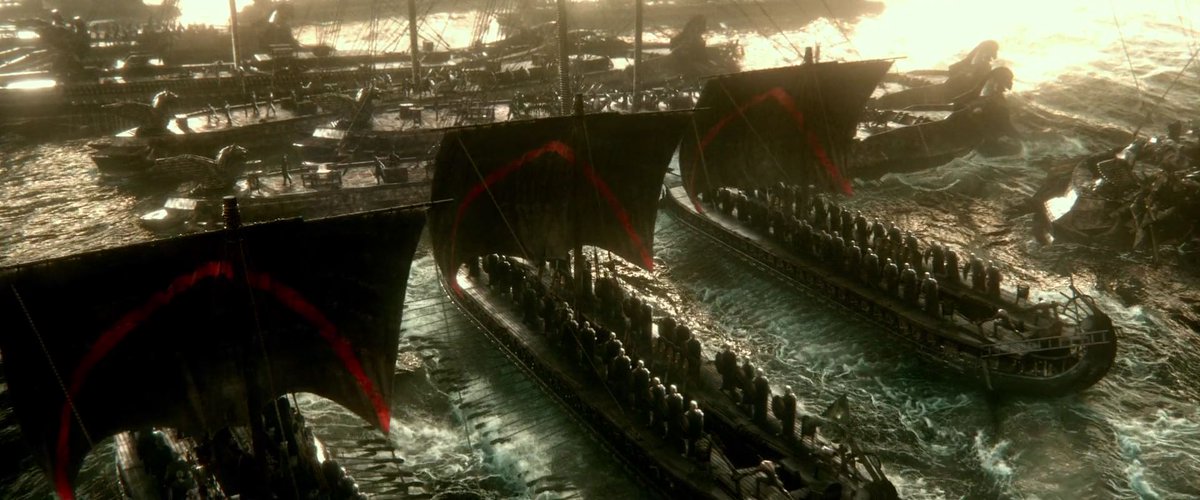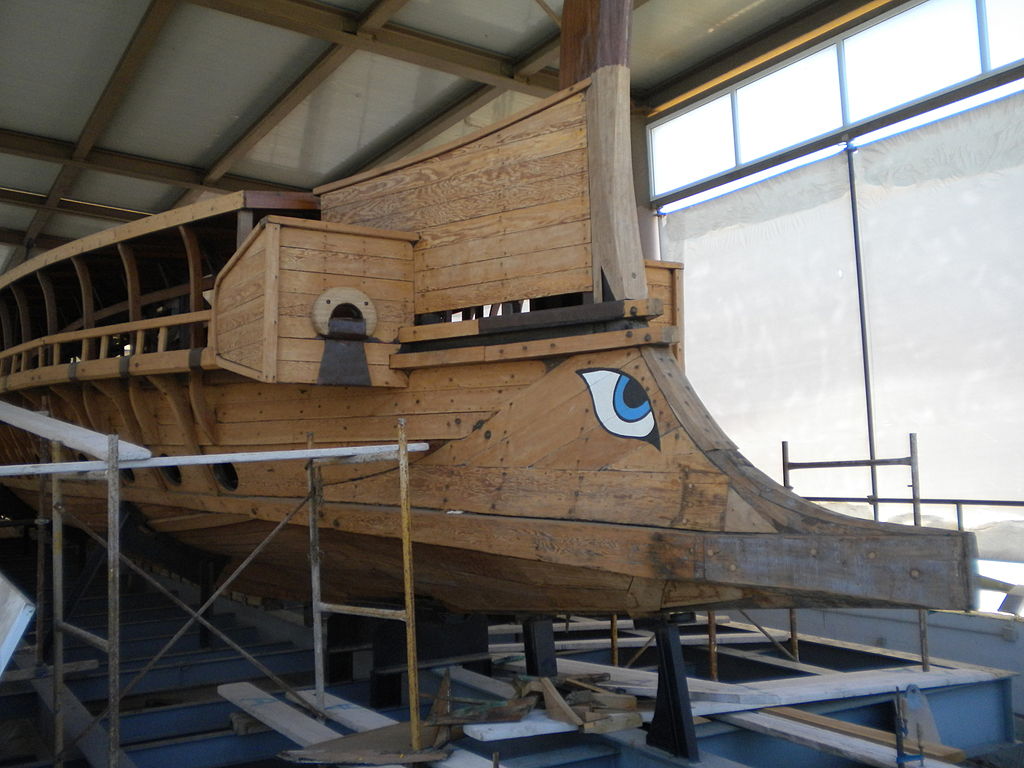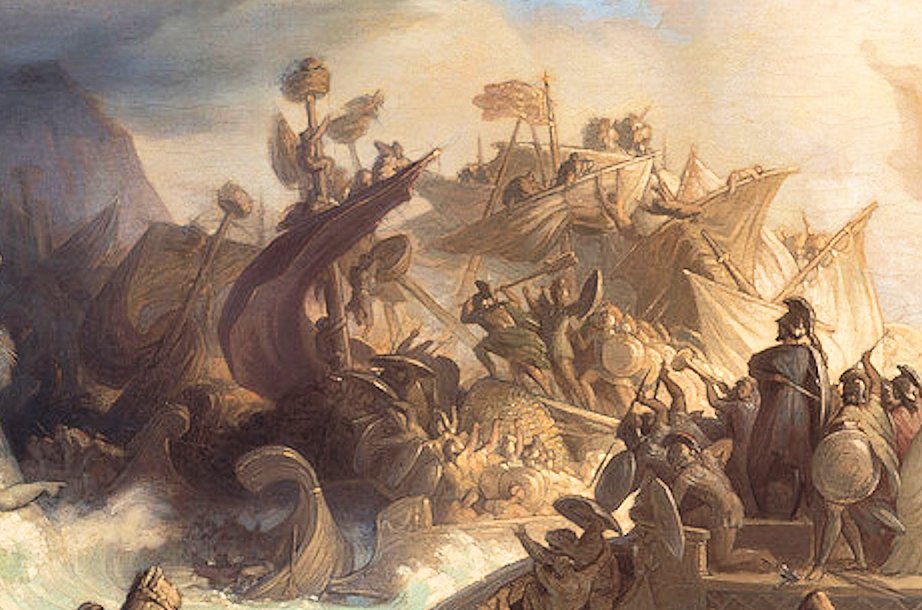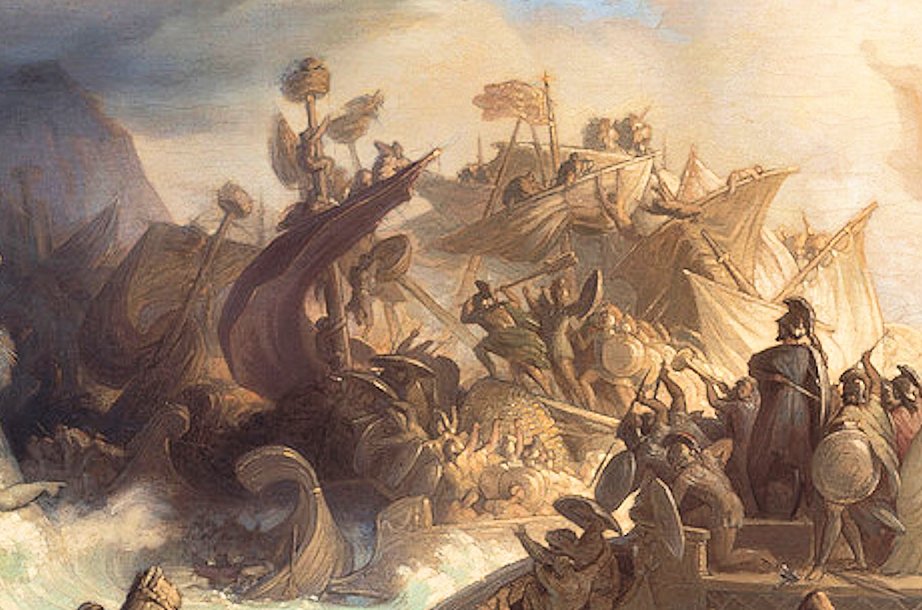2,499 years ago, approximately #OTD, a more interesting battle took place off the coast of Thermopylai - the naval battle of Artemision. Unlike Thermopylai, this one actually mattered.
It is not a well-known battle, so why not follow @Roelkonijn and I for yet another thread 1/18
It is not a well-known battle, so why not follow @Roelkonijn and I for yet another thread 1/18

Was this a united Greek fleet, in support of Leonidas' troops on land, standing against the Persian enemy: West vs East, good vs bad, freedom vs oppression?
No, not really
2/
No, not really
2/
The Greek fleet was made up of just under 300 ships, half were from Athens alone.
In total, only 14 city-states were present. 14!!! Out of what, about 1000?
3/
In total, only 14 city-states were present. 14!!! Out of what, about 1000?
3/

The Persian fleet actually had MORE than 300 ships supplied just by Greek states . . . that's more Greeks than the Greek fleet!
A united Greek front, this was not.
4/
A united Greek front, this was not.
4/
With Athens supplying half the allied ships you would think that they held command. That would make sense, it's logical.
Well, being logical was your first mistake. Of course, command went to a Spartan called Eurybiades.
# of Spartan ships in the fleet, you ask? 10
5/
Well, being logical was your first mistake. Of course, command went to a Spartan called Eurybiades.
# of Spartan ships in the fleet, you ask? 10
5/
When the Greeks realised how large the Persian fleet was, Eurybiades rather sensibly wanted to leave.
So to keep him there, the Euboians ended up bribing the commanders through a middle-man: Themistokles of Athens
6/
So to keep him there, the Euboians ended up bribing the commanders through a middle-man: Themistokles of Athens
6/

Why, you may ask? How big was the Persian fleet?
Over 1,200 triremes (war ships) and 3,000 other.
If accurate (probably not), this was the largest armada seen in Europe until the D-Day landings!
7/
Over 1,200 triremes (war ships) and 3,000 other.
If accurate (probably not), this was the largest armada seen in Europe until the D-Day landings!
7/
On day one of the three-day battle, the Greeks did not want to attack head on. Outnumbered as they were.
Persians didn't either, thinking the Greeks would just sail away. They sent a force around the island of Euboia to block off the retreat.
8/
Persians didn't either, thinking the Greeks would just sail away. They sent a force around the island of Euboia to block off the retreat.
8/
Greeks plan a skirmish, it goes wrong. The Greek fleet gets encircled by experienced Persian ships.
Greeks perform a kyklos (circle), rams pointing outward - like a hedgehog. On a signal, they erupt out from the centre and disrupt Persian lines.
First blood to the Greeks.
9/
Greeks perform a kyklos (circle), rams pointing outward - like a hedgehog. On a signal, they erupt out from the centre and disrupt Persian lines.
First blood to the Greeks.
9/
Day two, there is a big storm. The Persians are hit the hardest.
Most importantly, the Persian ships sent to cut off the Greek retreat were caught out in the open and every ship was destroyed.
200 war ships, gone. The Greek escape route was clear!
10/
Most importantly, the Persian ships sent to cut off the Greek retreat were caught out in the open and every ship was destroyed.
200 war ships, gone. The Greek escape route was clear!
10/

Day 3, the Greeks know a skirmish doesn’t work. Pesky Persians keep sending out more ships!
They plan to go all in, a full frontal assault on the Persian fleet – the Persians were weakened by the storm, what could go wrong?
11/
They plan to go all in, a full frontal assault on the Persian fleet – the Persians were weakened by the storm, what could go wrong?
11/
A lot, it seems!
The Persian fleet begin to form an arc, planning to encircle the Greeks again like last time.
Their plan was elegant: a tight circle=Greek panic=crowded spaces=smashed Greek ships=Persian win.
12/
The Persian fleet begin to form an arc, planning to encircle the Greeks again like last time.
Their plan was elegant: a tight circle=Greek panic=crowded spaces=smashed Greek ships=Persian win.
12/
Eurybiades gives the signal to sail out hard and fast before the circle is complete. The battle becomes a free-for-all, gone are the tactical ploys of day 1.
The boxing match has become a bar brawl.
13/
The boxing match has become a bar brawl.
13/
Day 3 ends, Athens has lost ½ of its fleet. The Persian fleet lost more ships, with the Egyptians suffering most. But there's no clear winner.
What to do next?
Plans are made, but then news comes from the mainland. Leonidas has died and Xerxes has won the day!
14/
What to do next?
Plans are made, but then news comes from the mainland. Leonidas has died and Xerxes has won the day!
14/

The Greeks retreat to Salamis to regroup and find out what the plan is next.
It wasn’t a victory, but they didn’t lose either. A victorious draw? A glorious retreat?
A not-so-brilliant, but-could-be-worse, start to the war?
15/
It wasn’t a victory, but they didn’t lose either. A victorious draw? A glorious retreat?
A not-so-brilliant, but-could-be-worse, start to the war?
15/
The fleet now had to wait. As they waited, Greece was ransacked down to Athens.
The Athenians evacuated the city in time, but Athens itself was burned, and Xerxes had everything under control.
16/
The Athenians evacuated the city in time, but Athens itself was burned, and Xerxes had everything under control.
16/
The Greeks were in serious trouble. The only thing going remotely in their favour was that their fleet had survived at Artemision.
This did not guarantee success, but it offered them hope. The imminent battle of Salamis was their last chance.
17/
This did not guarantee success, but it offered them hope. The imminent battle of Salamis was their last chance.
17/

For a run down of the battle in detail, check out this @HistoryHit ancient podcast podcast I did with @HistoryHitRome @ancientstristan : play.acast.com/s/the-ancients…
End/
End/
• • •
Missing some Tweet in this thread? You can try to
force a refresh









